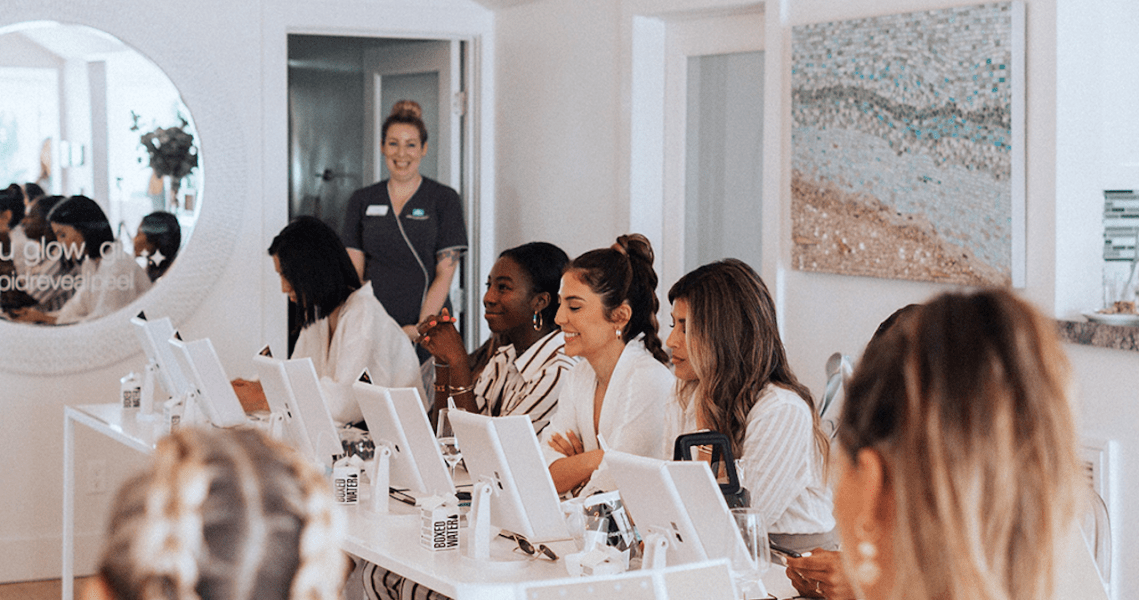Dermalogica, the skin-care brand and professional training school, is hosting its first-ever pop-up to stake its claim in the beauty market and emphasize its history as an education-first brand.
The four-day pop-up will be held from March 21 to 24 in New York City and will include tech-interactions, skin-care classes and a seven-foot-tall display on Dermalogica’s 33-year-old history. Called “The Dermalogica Experience,” the pop-up coincides with the brand’s launch of a new SPF product called Prisma Protect SPF30 earlier this month. According to Lauren Consiglio, Dermalogica vp of U.S. marketing and global programs, most customers — young and old — do not know that Dermalogica started as an institute three years before its product line was even developed.
“We have the right to say we are skin experts,” she said. “We want this to come through during the pop-up and have people understand the research and expertise of our brand. It’s authentic for us.”
To bring this sense of education and history to life, the brand is relying on its three “core pillars”: human touch, personalization and education. Lori MacGregor, a Dermalogica spokesperson, said that when visitors first enter the pop-up, they are greeted by a wall display providing a deep dive into the brand’s history. It includes the an explanation of the founding of the brand by Jane Wurwand via The International Dermal Institute, visuals of its trade advertising campaign from 2000 dubbed “We’re not pretty,” and images of older product packaging.
Today, Dermalogica is owned by Unilever (which acquired it in 2015). The brand declined to provide sales figures, but in 2018, its U.S. division grew 11 percent. The brand is sold in 106 markets.
The human touch and education aspects are emphasized by skin-care facialists through 10-minute consultations, and 15 classes being offered on topics like acne, anti-aging and skin health. These classes will accommodate between 50 and 100 people, MacGregor said. There is also an iPad station where shoppers can interact with Dermalogica’s existing skin analysis platforms called Dry Skin Lens, which determines a user’s dry spots; My Skin Clock, which educates people about their circadian rhythm; and Face Mapping, that determines a person’s skin goals and corresponding product recommendations.
An education-first approach has become a popular marketing strategy for many brands and retailers, especially with the new attention on ingredient transparency within the clean beauty movement. Beautycounter, Maybelline, Follain and Credo have all built beauty and ingredient education into their businesses and digital marketing platforms. Research from Virginia Commonwealth University Brandcenter and the VCU School of Business suggests that brands emphasizing education to its customers benefit from long-term loyalty and referrals.
Dermalogica’s point of view is that it is not jumping on a bandwagon. For example, it trains over 100,000 professionals worldwide every year and currently maintains education partnerships with five cosmetology schools, like the Minnesota School of Cosmetology and Tricoci University of Beauty Culture.
“We don’t use the word ‘beauty’ in our company. We use [skin health], which is a major trend right now, but we’ve been talking about this for 30 years,” Consiglio said.
In addition to reaching customers in-person through the pop-up, the brand will also be amplifying the event through social media. During classes, there will be a video crew present to live-stream sessions on Instagram Stories, where the brand has 275,000 followers. Dermalogica will also shoot longer form content of classes that will be uploaded to the brand’s YouTube channel, where it has over 12,000 subscribers. Videos will feature answers to the brand’s Instagram followers’ most-asked skin-care questions.
“People are looking for meaningful experiences, and we wanted to bring our three pillars to life in real life ways. We want to get in front of more consumers,” said Consiglio.




